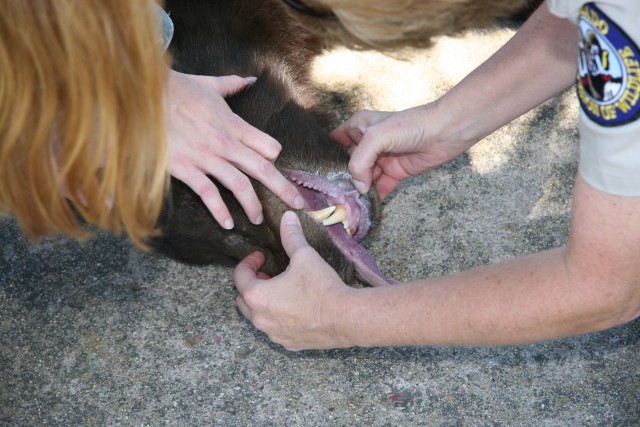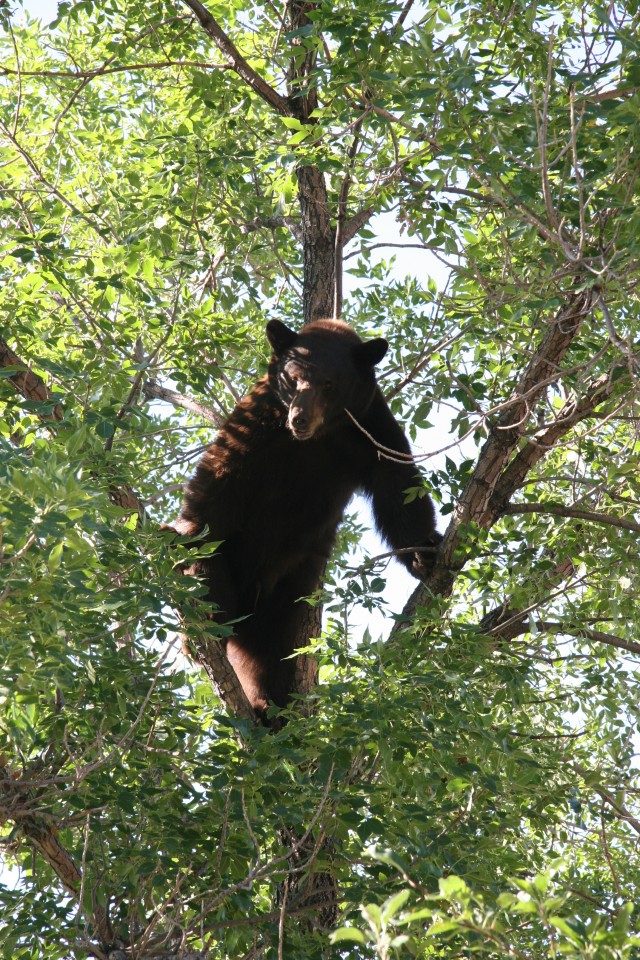FORT CARSON, Colo.-Fort Carson wildlife conservation and Provost Marshal police officers were dispatched to Cheyenne Village housing area Aug. 25 to respond to a 200-pound black bear nestled in a tree enjoying some apples.
Officials kept the bear in the tree to ensure the safety of the Mountain Post community until Colorado Division of Wildlife officers arrived on scene. Fort Carson conservation officers tranquilized the bear and, after post veterinarians examined the sleeping giant, transported the bear to PiAfA+-on Canyon per request of Colorado Division of Wildlife officials. The bear was released back into the wild.
Bears are out actively foraging for food to fatten up before winter starts.
Black bears are the largest carnivores in Colorado. There are no known grizzly bears living in the state; the last confirmed sighting of a grizzly in Colorado was in 1979. Although called black bears, they can be blond, brown, cinnamon or black. On average, an adult weighs between 175 and 275 pounds, but depending upon the time of the year, food supply and gender, they may weigh anywhere from 100-450 pounds. They are naturally shy, very wary of people and their normal response to any perceived danger is to run away.
It takes a lot of food to pack on the pounds needed to survive the winter. In late summer and throughout the fall, black bears are putting on fat at the rate of 1.5 pounds per day. They aren't really fussy about where those calories come from, but they primarily eat plants, berries, nuts and insects. Unfortunately, they will also eat garbage, pet food and bird seed.
This late summer gorging is usually what brings these wide-ranging animals into the housing areas of Fort Carson. Conflicts develop between people and bears when their drive to eat overcomes the animal's natural wariness of humans. Much of what people throw away smells like food to a hungry bear.
Never leave trash out overnight. A study confirmed that simply putting out trash on the morning of pick-up significantly reduces the chances of a bear visit. To avoid attracting bears, trash containers should regularly be cleaned with ammonia or bleach.
Don't feed birds during the months when bears are active. Seeds are a natural food for bears. Pet food is another high-calorie treat that will attract a bear. A bear's nose is nearly 100 times more sensitive than a human's, and pet food regularly left outside will condition a bear to associate the home with food.
And please remember, don't feed bears - it's illegal in Colorado. Even though black bears are not naturally aggressive and seldom injure people, they are still strong, powerful animals. A bear intent on getting a meal could injure someone in its way. Bears that get too comfortable around people may become a threat to human safety. Habituated bears must often be relocated, and in extreme cases, may have to be destroyed.
Do your part to bear-proof your home and yard, and help keep the bears alive and wild.
If a bear is spotted on post, contact the Military Police immediately at 526-2333. For more information on bears or encounters with other wildlife, call the Fort Carson Conservation Law Enforcement Program at 524-5394.










Social Sharing